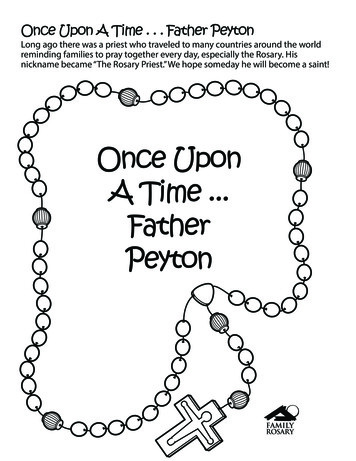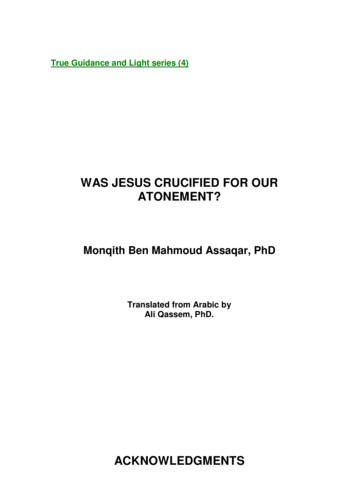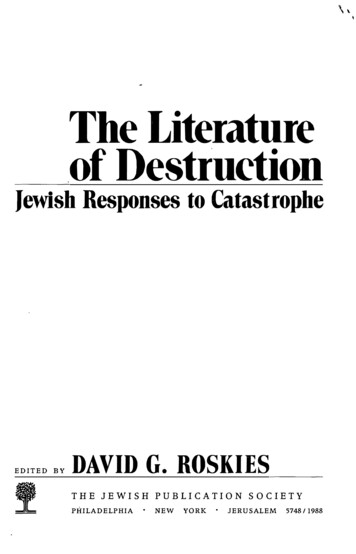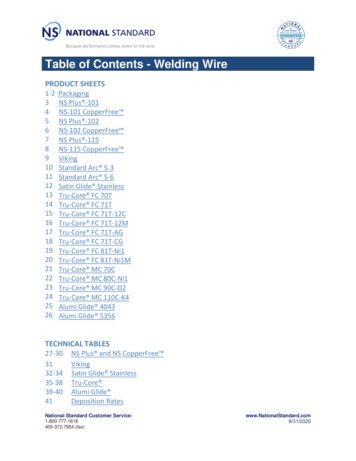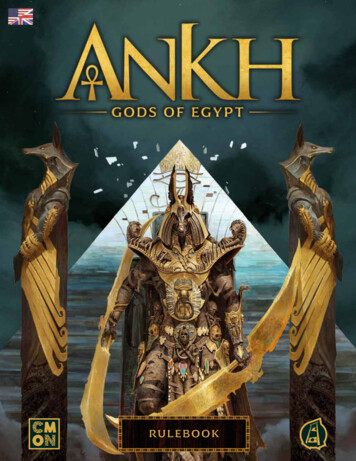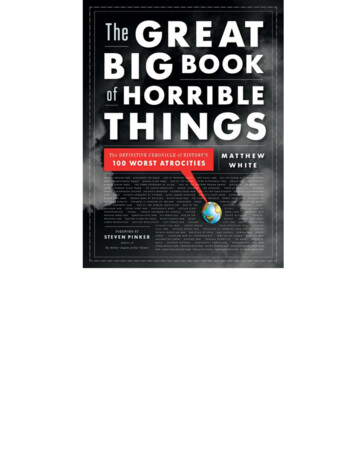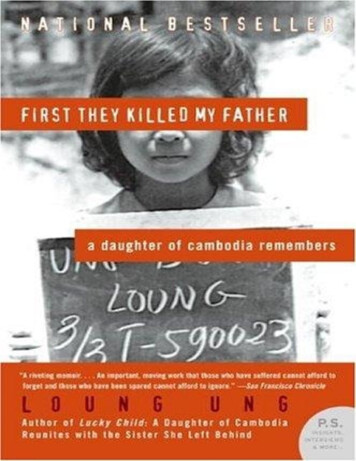
Transcription
firstthey killed my fathera daughter of cambodiaremembersLOUNG UNG
In memory of the two million people who perished under the Khmer Rouge regime.This book is dedicated to my father, Ung; Seng Im, who always believed in me; my mother, Ung; AyChoung, who always loved me.To my sisters Keav, Chou, and Geak because sisters are forever; my brother Kim, who taught me aboutcourage; my brother Khouy, for contributing more than one hundred pages of our family history and detailsof our lives under the Khmer Rouge, many of which I incorporated into this book; to my brother Meng andsister-in-law Eang Muy Tan, who raised me (quite well) in America.
contentsAuthor’s Notefamily chart 1975Phnom Penh April 1975The Ung Family April 1975Takeover April 17, 1975Evacuation April 1975Seven-Day Walk April 1975Krang Truop April 1975Waiting Station July 1975Anglungthmor July 1975Ro Leap November 1975Labor Camps January 1976New Year’s April 1976Keav August 1976Pa December 1976Ma’s Little Monkey April 1977Leaving Home May 1977Child Soldiers August 1977Gold for Chicken November 1977The Last Gathering May 1978The Walls Crumble November 1978The Youn Invasion January 1979The First Foster Family January 1979Flying Bullets February 1979
Khmer Rouge Attack February 1979The Execution March 1979Back to Bat Deng April 1979From Cambodia to Vietnam October 1979Lam Sing Refugee Camp February 1980EpilogueAcknowledgmentsResourcesP.SPraiseAlso By Loung UngCopyrightAbout the Publisher
author’s noteFrom 1975 to 1979—through execution, starvation, disease, and forcedlabor—the Khmer Rouge systematically killed an estimated two millionCambodians, almost a fourth of the country’s population.This is a story of survival: my own and my family’s. Though these eventsconstitute my experience, my story mirrors that of millions of Cambodians.If you had been living in Cambodia during this period, this would be yourstory too.
family chart 1975
phnom penhApril 1975Phnom Penh city wakes early to take advantage of the cool morning breezebefore the sun breaks through the haze and invades the country with swelteringheat. Already at 6 people in Phnom Penh are rushing and bumping into eachother on dusty, narrow side streets. Waiters and waitresses in black-and-whiteuniforms swing open shop doors as the aroma of noodle soup greets waitingcustomers. Street vendors push food carts piled with steamed dumplings,smoked beef teriyaki sticks, and roasted peanuts along the sidewalks and beginto set up for another day of business. Children in colorful T-shirts and shorts kicksoccer balls on sidewalks with their bare feet, ignoring the grunts and screams ofthe food cart owners. The wide boulevards sing with the buzz of motorcycleengines, squeaky bicycles, and, for those wealthy enough to afford them, smallcars. By midday, as temperatures climb to over a hundred degrees, the streetsgrow quiet again. People rush home to seek relief from the heat, have lunch, takecold showers, and nap before returning to work at 2 P.M.My family lives on a third-floor apartment in the middle of Phnom Penh, so Iam used to the traffic and the noise. We don’t have traffic lights on our streets;instead, policemen stand on raised metal boxes, in the middle of the intersectionsdirecting traffic. Yet the city always seems to be one big traffic jam. My favoriteway to get around with Ma is the cyclo because the driver can maneuver it in theheaviest traffic. A cyclo resembles a big wheelchair attached to the front of abicycle. You just take a seat and pay the driver to wheel you around whereveryou want to go. Even though we own two cars and a truck, when Ma takes me tothe market we often go in a cyclo because we get to our destination faster. Sittingon her lap I bounce and laugh as the driver pedals through the congested citystreets.A.M.
This morning, I am stuck at a noodle shop a block from our apartment in thisbig chair. I’d much rather be playing hopscotch with my friends. Big chairsalways make me want to jump on them. I hate the way my feet just hang in theair and dangle. Today, Ma has already warned me twice not to climb and standon the chair. I settle for simply swinging my legs back and forth beneath thetable.Ma and Pa enjoy taking us to a noodle shop in the morning before Pa goes offto work. As usual, the place is filled with people having breakfast. The clang andclatter of spoons against the bottom of bowls, the slurping of hot tea and soup,the smell of garlic, cilantro, ginger, and beef broth in the air make my stomachrumble with hunger. Across from us, a man uses chopsticks to shovel noodlesinto his mouth. Next to him, a girl dips a piece of chicken into a small saucer ofhoisin sauce while her mother cleans her teeth with a toothpick. Noodle soup is atraditional breakfast for Cambodians and Chinese. We usually have this, or for aspecial treat, French bread with iced coffee.“Sit still,” Ma says as she reaches down to stop my leg midswing, but I end upkicking her hand. Ma gives me a stern look and a swift slap on my leg.“Don’t you ever sit still? You are five years old. You are the most troublesomechild. Why can’t you be like your sisters? How will you ever grow up to be aproper young lady?” Ma sighs. Of course I have heard all this before.It must be hard for her to have a daughter who does not act like a girl, to be sobeautiful and have a daughter like me. Among her women friends, Ma isadmired for her height, slender build, and porcelain white skin. I often overhearthem talking about her beautiful face when they think she cannot hear. BecauseI’m a child, they feel free to say whatever they want in front of me, believing Icannot understand. So while they’re ignoring me, they comment on her perfectlyarched eyebrows; almond-shaped eyes; tall, straight Western nose; and oval face.At 5′6″, Ma is an amazon among Cambodian women. Ma says she’s so tallbecause she’s all Chinese. She says that some day my Chinese side will alsomake me tall. I hope so, because now when I stand I’m only as tall as Ma’s hips.“Princess Monineath of Cambodia, now she is famous for being proper,” Macontinues. “It is said that she walks so quietly that no one ever hears herapproaching. She smiles without ever showing her teeth. She talks to menwithout looking directly in their eyes. What a gracious lady she is.” Ma looks atme and shakes her head.“Hmm ” is my reply, taking a loud swig of Coca-Cola from the small bottle.Ma says I stomp around like a cow dying of thirst. She’s tried many times to
teach me the proper way for a young lady to walk. First, you connect your heelto the ground, then roll the ball of your feet on the earth while your toes curl uppainfully. Finally you end up with your toes gently pushing you off the ground.All this is supposed to be done gracefully, naturally, and quietly. It all sounds toocomplicated and painful to me. Besides, I am happy stomping around.“The kind of trouble she gets into, while just the other day she—”Macontinues to Pa but is interrupted when our waitress arrives with our soup.“Phnom Penh special noodles with chicken for you and a glass of hot water,”says the waitress as she puts the steaming bowl of translucent potato noodlesswimming in clear broth before Ma. “Two spicy Shanghai noodles with beeftripe and tendons.” Before she leaves, the waitress also puts down a plate filledwith fresh bean sprouts, lime slices, chopped scallions, whole red chili peppers,and mint leaves.As I add scallions, bean sprouts, and mint leaves to my soup, Ma dips myspoon and chopsticks into the hot water, wiping them dry with her napkin beforehanding them back to me. “These restaurants are not too clean, but the hot waterkills the germs.” She does the same to her and Pa’s tableware. While Ma tastesher clear broth chicken noodle soup, I drop two whole red chili peppers in mybowl as Pa looks on approvingly. I crush the peppers against the side of the bowlwith my spoon and finally my soup is ready to taste the way I like it. Slowly, Islurp the broth and instantaneously my tongue burns and my nose drips.A long time ago, Pa told me that people living in hot countries should eatspicy foods because it makes them drink more water. The more water we drink,the more we sweat, and sweating cleanses our bodies of impurities. I don’tunderstand this, but I like the smile he gives me; so I again reach my chopstickstoward the pepper dish, knocking over the salt shaker, which rolls like a fallenlog onto the floor.“Stop what you’re doing,” Ma hisses.“It was an accident,” Pa tells her and smiles at me.Ma frowns at Pa and says, “Don’t you encourage her. Have you forgotten thechicken fight episode? She said that was an accident also and now look at herface.”I can’t believe Ma is still angry about that. It was such a long time ago, whenwe visited my uncle’s and aunt’s farm in the countryside and I played with theirneighbor’s daughter. She and I had a chicken we would carry around to havefights with the other kids’ chickens. Ma wouldn’t have found out about it if itweren’t for the big scratch that still scars my face.
“The fact that she gets herself in and out of these situations gives me hope. Isee them as clear signs of her cleverness.” Pa always defends me—to everybody.He often says that people just don’t understand how cleverness works in a childand that all these troublesome things I do are actually signs of strength andintelligence. Whether or not Pa is right, I believe him. I believe everything Patells me.If Ma is known for her beauty, Pa is loved for his generous heart. At 5′5″, heweighs about 150 pounds and has a large, stocky shape that contrasts with Ma’slong, slender frame. Pa reminds me of a teddy bear, soft and big and easy to hug.Pa is part Cambodian and part Chinese and has black curly hair, a wide nose, fulllips, and a round face. His eyes are warm and brown like the earth, shaped like afull moon. What I love most about Pa is the way he smiles not only with hismouth but also with his eyes.I love the stories about how my parents met and married. While Pa was amonk, he happened to walk across a stream where Ma was gathering water withher jug. Pa took one look at Ma and was immediately smitten. Ma saw that hewas kind, strong, and handsome, and she eventually fell in love with him. Pa quitthe monastery so he could ask her to marry him, and she said yes. However,because Pa is dark-skinned and was very poor, Ma’s parents refused to let themmarry. But they were in love and determined, so they ran away and eloped.They were financially stable until Pa turned to gambling. At first, he was goodat it and won many times. Then one day he went too far and bet everything on agame—his house and all his money. He lost that game and almost lost his familywhen Ma threatened to walk out on him if he did not stop gambling. After that,Pa never played card games again. Now we are all forbidden to play cards oreven to bring a deck of cards home. If caught, even I will receive gravepunishment from him. Other than his gambling, Pa is everything a good fathercould be: kind, gentle, and loving. He works hard, as a military police captain soI don’t get to see him as much as I want. Ma tells me that his never came fromstepping on everyone along the way. Pa never forgot what it was like to be poor,and as a result, he takes time to help many others in need. People truly respectand like him.“Loung is too smart and clever for people to understand,” Pa says and winksat me. I beam at him. While I don’t know about the cleverness part, I do knowthat I am curious about the world—from worms and bugs to chicken fights andthe bras Ma hangs in her room.“There you go again, encouraging her to behave this way.” Ma looks at me,
but I ignore her and continue to slurp my soup. “The other day she walked up toa street vendor selling grilled frog legs and proceeded to ask him all thesequestions. ‘Mister, did you catch the frogs from the ponds in the country or doyou raise them? What do you feed frogs? How do you skin a frog? Do you findworms in its stomach? What do you do with the bodies when you sell only thelegs?’ Loung asked so many questions that the vendor had to move his cart awayfrom her. It is just not proper for a girl to talk so much.”Squirming around in a big chair, Ma tells me, is also not proper behavior.“I’m full, can I go?” I ask, swinging my legs even harder.“All right, you can go play.” Ma says with a sigh. I jump out of the chair andhead off to my friend’s house down the street.Though my stomach is full, I still crave salty snack food. With the money Pagave me in my pocket, I approach a food cart selling roasted crickets. There arefood carts on every corner, selling everything from ripe mangoes to sugarcane,from Western cakes to French crêpes. The street foods are readily available andalways cheap. These stands are very popular in Cambodia. It is a common sightin Phnom Penh to see people on side streets sitting in rows on squat stools eatingtheir food. Cambodians eat constantly, and everything is there to be savored ifyou have money in your pocket, as I do this morning.Wrapped in a green lotus leaf, the brown, glazed crickets smell of smokedwood and honey. They taste like salty burnt nuts. Strolling slowly along thesidewalk, I watch men crowd around the stands with the pretty young girls atthem. I realize that a woman’s physical beauty is important, that it never hurtsbusiness to have attractive girls selling your products. A beautiful young womanturns otherwise smart men into gawking boys. I’ve seen my own brothers buysnacks they’d never usually eat from a pretty girl while avoiding delicious foodsold by homely girls.At five I also know I am a pretty child, for I have heard adults say to Ma manytimes how ugly I am. “Isn’t she ugly?” her friends would say to her. What black,shiny hair, look at her brown, smooth skin! That heart-shaped face makes onewant to reach out and pinch those dimpled apple cheeks. Look at those full lipsand her smile! Ugly!“Don’t tell me I am ugly! I would scream at them, and they would laugh.That was before Ma explained to me that in Cambodia people don’t outrightcompliment a child. They don’t want to call attention to the child. It is believedthat evil spirits easily get jealous when they hear a child being complimented,and they may come and take away the child to the other world.
the ung familyApril 1975We have a big family, nine in all: Pa, Ma, three boys, and four girls. Fortunately,we have a big apartment that houses everyone comfortably. Our apartment isbuilt like a train, narrow in the front with rooms extending out to the back. Wehave many more rooms than the other houses I’ve visited. The most importantroom in our house is the living room, where we often watch television together.It is very spacious and has an unusually high ceiling to leave room for the loftthat my three brothers share as their bedroom. A small hallway leading to thekitchen splits Ma and Pa’s bedroom from the room my three sisters and I share.The smell of fried garlic and cooked rice fills our kitchen when the family takestheir usual places around a mahogany table where we each have our ownhighbacked teak chair. From the kitchen ceiling the electric fan spinscontinuously, carrying these familiar aromas all around our house—even into ourbathroom. We are very modern—our bathroom is equipped with amenities suchas a flushing toilet, an iron bathtub, and running water.I know we are middle-class because of our apartment and the possessions wehave. Many of my friends live in crowded homes with only two or three roomsfor a family of ten. Most well-to-do families live in apartments or houses abovethe ground floor. In Phnom Penh, it seems that the more money you have, themore stairs you have to climb to your home. Ma says the ground level isundesirable because dirt gets into the house and nosy people are always peekingin, so of course only poor people live on the ground level. The trulyimpoverished live in makeshift tents in areas where I have never been allowed towander.Sometimes on the way to the market with Ma, I catch brief glimpses of thesepoor areas. I watch with fascination as children with oily black hair, wearing old,
dirty clothes run up to our cyclo in their bare feet. Many look about the samesize as me as they rush over with naked younger siblings bouncing on theirbacks. Even from afar, I see red dirt covers their faces, nestling in the creases oftheir necks and under their fingernails. Holding up small wooden carvings of theBuddha, oxen, wagons, and miniature bamboo flutes with one hand, theybalance oversized woven straw baskets on their heads or straddled on their hipsand plead with us to buy their wares. Some have nothing to sell and approach usmurmuring with extended hands. Every time, before I can make out what theysay, the cyclo’s rusty bell clangs noisily, forcing the children to scurry out of ourway.There are many markets in Phnom Penh, some big and others small, but theirproducts are always similar. There is the Central Market, the Russian Market, theOlympic Market, and many others. Where people go to shop depends on whichmarket is the closest to their house. Pa told me the Olympic Market was once abeautiful building. Now its lackluster façade is gray from mold and pollution,and its walls cracked from neglect. The ground that was once lush and green,filled with bushes and flowers, is now dead and buried under outdoor tents andfood carts, where thousands of shoppers traverse everyday.Under the bright green and blue plastic tents vendors sell everything fromfabrics with stripes, paisley, and flowers to books in Chinese, Khmer, English,and French. Cracked green coconuts, tiny bananas, orange mangoes, and pinkdragon fruit are on sale as are delicacies such as silver squid—their beady eyeswatching their neighbors—and teams of brown tiger shrimp crawling in whiteplastic buckets. Indoors, where the temperature is usually ten degrees cooler,well-groomed girls in starched shirts and pleated skirts perch on tall stoolsbehind glass stalls displaying gold and silver jewelry. Their ears, necks, fingers,and hands are heavy with yellow twenty-four-carat gold jewels as they beckonyou over to their counters. A couple of feet across from the women, behindyellow, featherless chickens hanging from hooks, men in bloody aprons raisetheir cleavers and cut into slabs of beef with the precision of many years’practice. Farther away from the meat vendors, fashionable youths with thin ElvisPresley sideburns in bell-bottom pants and corduroy jackets play loudCambodian pop music from their eight-track tape players. The songs and theshouting vendors bounce off of each other, all vying for your attention.Lately, Ma has stopped taking me to the market with her. But I still wake upearly to watch as she sets her hair in hot rollers and applies her makeup. I pleadwith her to take me, as she slips into her blue silk shirt and maroon sarong. I begher to buy me cookies while she puts on her gold necklace, ruby earrings, and
bracelets. After dabbing perfume around her neck, Ma yells to our maid to lookafter me and leaves for the market.Because we do not have a refrigerator, Ma shops every morning. Ma likes itthis way because everything we eat each day is at its freshest. The pork, beef,and chicken she brings back is put in a trunk-sized cooler filled with blocks ofice bought from the ice shop down the street. When she returns hot and fatiguedfrom a day of shopping, the first thing she does, following Chinese culture, is totake off her sandals and leave them at the door. She then stands in her bare feeton the ceramic tile floor and breathes a sigh of relief as the coolness of the tileflows through the soles of her feet.At night, I like to sit out on our balcony with Pa and watch the world below uspass by. From our balcony, most of Phnom Penh looms only two or three storieshigh, with few buildings standing as tall as eight. The buildings are narrow,closely built, as the city’s perimeter is longer than it is wide, stretching two milesalong the Tonle Sap River. The city owes its ultramodern look to the Frenchcolonial buildings that are juxtaposed with the dingy, soot-covered ground-levelhouses.In the dark, the world is quiet and unhurried as streetlights flicker on and off.Restaurants close their doors and food carts disappear into side streets. Somecyclo drivers climb into their cyclo to sleep while others continue to peddlearound, looking for fares. Sometimes when I feel brave, I walk over to the edgeof the railing and look down at the lights below. When I’m very brave, I climbonto the railing, holding on to the banister very tightly. With my whole bodysupported by the railing I dare myself to look at my toes as they hang at the edgeof the world. As I look down at the cars and bicycles below, a tingling sensationrushes to my toes, making them feel as if a thousand little pins are gentlypricking them. Sometimes, I just hang there against the railing, letting go of thebanister altogether, stretching my arms up high above my head. My arms looseand flapping in the wind, I pretend that I am a dragon flying high above the city.The balcony is a special place because it’s where Pa and I often have importantconversations.When I was small, much younger than I am now, Pa told me that in a certainChinese dialect my name, Loung, translates into “dragon.” He said that dragonsare the animals of the gods, if not gods themselves. Dragons are very powerfuland wise and can often see into the future. He also explained that, like in themovies, occasionally one or two bad dragons can come to earth and wreak havocon the people, though most act as our protectors.
“When Kim was born I was out walking,” Pa said a few nights ago. “All of asudden, I looked up and saw these beautiful puffy white clouds moving towardme. It was as if they were following me. Then the clouds began to take the shapeof a big, fierce-looking dragon. The dragon was twenty or thirty feet long, hadfour little legs, and wings that spread half its body length. Two curly horns grewout of its head and shot off in opposite directions. Its whiskers were five feetlong and swayed gently back and forth as if doing a ribbon dance. Suddenly itswooped down next to me and stared at me with its eyes, which were as big astires. ‘You will have a son, a strong and healthy son who will grow up to domany wonderful things.’ And that is how I heard of the news about Kim.” Patold me the dragon visited him many times, and each time it gave him messagesabout our births. So here I am, my hair dancing about like whiskers behind me,and my hands flapping like wings, flying above the world until Pa summons meaway.Ma says I ask too many questions. When I ask what Pa does at work, she tellsme he is a military policeman. He has four stripes on his uniform, which meanshe makes good money. Ma then said that someone once tried to kill him byputting a bomb in our trashcan when I was one or two years old. I have nomemory of this and ask, “Why would someone want to kill him?” I asked her.“When the planes started dropping bombs in the countryside, many peoplemoved to Phnom Penh. Once here, they could not find work and they blamed thegovernment. These people didn’t know Pa, but they thought all officers werecorrupt and bad. So they targeted all the high-ranking officers.”“What are bombs? Who’s dropping them?”“You’ll have to ask Pa that,” she replied.Later that evening, out on the balcony, I asked Pa about the bombs dropping inthe countryside. He told me that Cambodia is fighting a civil war, and that mostCambodians do not live in cities but in rural villages, farming their small plot ofland. And bombs are metal balls dropped from airplanes. When they explode,the bombs make craters in the earth the size of small ponds. The bombs killfarming families, destroy their land, and drive them out of their homes. Nowhomeless and hungry, these people come to the city seeking shelter and help.Finding neither, they are angry and take it out on all officers in the government.His words made my head spin and my heart beat rapidly.“Why are they dropping the bombs?” I asked him.“Cambodia is fighting a war that I do not understand and that is enough ofyour questions,” he said and became quiet.
The explosion from the bomb in our trashcan knocked down the walls of ourkitchen, but luckily no one was hurt. The police never found out who put thebomb there. My heart is sick at the thought that someone actually tried to hurtPa. If only these new people in the city could understand that Pa is a very niceman, someone who’s always willing to help others, they would not want to hurthim.Pa was born in 1931 in Tro Nuon, a small, rural village in the Kampong Champrovince. By village standards, his family was well-to-do and Pa was giveneverything he needed. When he was twelve years old, his father died and hismother remarried. Pa’s stepfather was often drunk and would physically abusehim. At eighteen, Pa left home and went to live in a Buddhist temple to get awayfrom his violent home, further his study, and eventually became a monk. He toldme that during his life as a monk, wherever he walked he had to carry a broomand dustpan to sweep the path in front of him so as not to kill any living thingsby stepping on them. After leaving the monastic order to marry Ma, Pa joinedthe police force. He was so good he was promoted to the Cambodian RoyalSecret Service under Prince Norodom Sihanouk. As an agent, Pa workedundercover and posed as a civilian to gather information for the government. Hewas very secretive about his work. Thinking he could fare better in the privatesector, he eventually quit the force to go into business with friends. After PrinceSihanouk’s government fell in 1970, he was conscripted into the newgovernment of Lon Nol. Though promoted to a major by the Lon Nolgovernment, Pa said he did not want to join but had to, or he would risk beingpersecuted, branded a traitor, and perhaps even killed.“Why? Is it like this in other places?” I asked him.“No,” he says, stroking my hair. “You ask a lot of questions.” Then the cornerof his mouth turns upside down and his eyes leave my face. When he speaksagain, his voice is weary and distant.“In many countries, it’s not that way,” he says. “In a country called America itis not that way.”“Where is America?”“It’s a place far, far away from here, across many oceans.”“And in America, Pa, you would not be forced to join the army?”“No, there two political parties run the country. One side is called theDemocrats and the other the Republicans. During their fights, whichever sidewins, the other side has to look for different jobs. For example, if the Democratswin, the Republicans lose their jobs and often have to go elsewhere to find new
jobs. It is not this way in Cambodia now. If the Republicans lost their fights inCambodia, they would all have to become Democrats or risk punishment.”Our conversation is interrupted when my oldest brother joins us on thebalcony. Meng is eighteen and adores us younger children. Like Pa, he is verysoft-spoken, gentle, and giving. Meng is a responsible, reliable type who was thevaledictorian of his class. Pa just bought him a car, and it seems he uses it todrive his books around instead of girls. But Meng does have a girlfriend, andthey are to be married when he returns from France with his degree. He was toleave for France on April 14 to go college, but because the thirteenth was NewYear’s, Pa let him stay for the celebration.While Meng is the brother we look up to, Khouy is the brother we fear. Khouyis sixteen and more interested in girls and karate than books. His motorcycle ismore than a transportation vehicle; it is a girl magnet. He fancies himselfextremely cool and suave, but I know that he is mean. In Cambodia, if the fatheris busy with work and the mother is busy with babies and shopping, theresponsibility of disciplining and punishing the younger siblings often falls onthe oldest child. In our family, because none of us fear Meng, this role falls toKhouy, who is not easily dissuaded by our charms or excuses. Even though he’snever carried out his threat to hit us, we all fear him and always do what he says.My oldest sister, Keav, is already beautiful at fourteen. Ma says she will havemany men seeking her hand in marriage and can pick anyone she wants.However, Ma also says that Keav has the misfortune to like to gossip and arguetoo much. This trait is not considered ladylike. As Ma sets to work shaping Keavinto a great lady, Pa has more serious worries. He wants to keep her safe. Heknows that people are so discontent they are taking their anger out on thegovernment officers’ families. Many of his colleagues’ daughters have beenharassed on the streets or even kidnapped. Pa is so afraid something will happento her that he has two military policemen follow her everywhere she goes.Kim, whose name in Chinese means “gold,” is my ten-year-old brother. Manicknamed him the little monkey” because he is small, agile, and quick on hisfeet. He watches a lot of Chinese martial arts movies and annoys us with hisimitations of the movies’ monkey style. I used to think he was weird, but havingmet other girls with brothers his age, I realize that older brothers are all thesame. Their whole purpose for being is to pick on you and provoke you.Chou, my older sister by three years, is the complete opposite of me. Hername means “gem” in Chinese. At eight, she is quiet, shy, and obedient. Ma isalways comparing us and asking why I cannot behave nicely like her. Unlike the
rest of us, Chou takes after Pa and has unusually dark skin. My older brotherskid her about how she really isn’t one of us. They tease her about how Pa foundher abandoned near our trashcan and adopted her out of pity.I am next in line and at five, I am already as big as Chou. Most of my siblingsregard me as being spoiled
first they killed my father a daughter of cambodia . This book is dedicated to my father, Ung; Seng Im, who always believed in me; my mother, Ung; Ay Choung, who always loved me. To my sisters Keav, Chou, and Geak because sisters are forever; my brother

